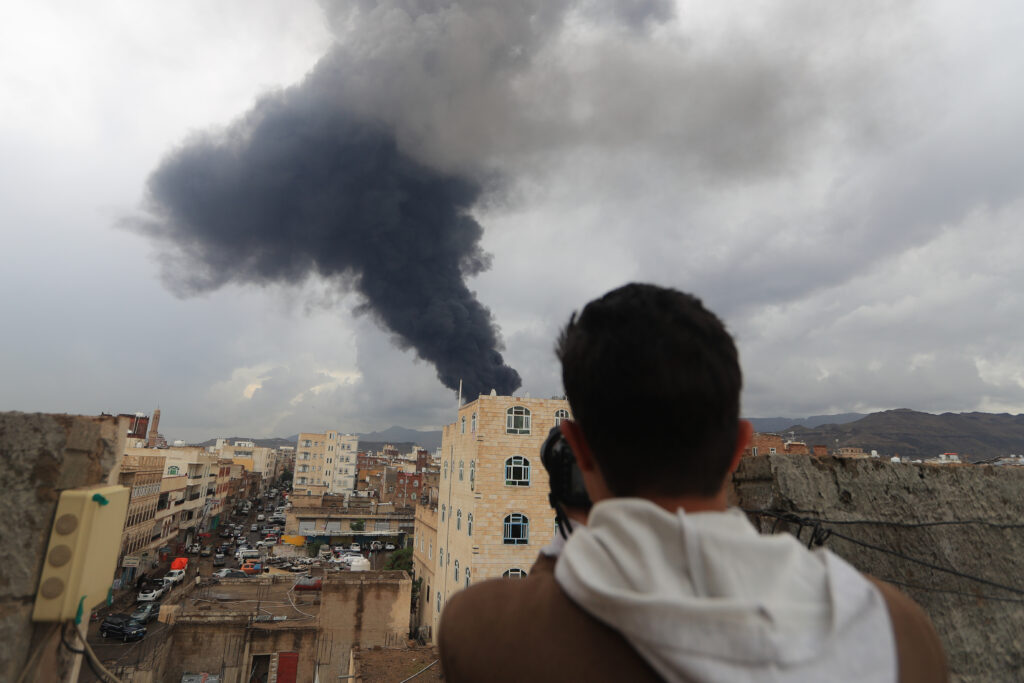Yémen: frappes israéliennes meurtrières contre des cibles des rebelles houthis
Israël a mené des frappes dimanche contre des sites des rebelles houthis à Sanaa, faisant deux morts et 35 blessés, une semaine après des raids similaires sur la capitale yéménite, ont indiqué les insurgés pro-iraniens.Affirmant agir en solidarité avec les Palestiniens de Gaza, en proie à la guerre entre Israël et le Hamas, les Houthis lancent régulièrement des attaques aux missiles et drones en direction du territoire israélien, mais la plupart sont interceptés.”Agression israélienne sur la capitale Sanaa”, la capitale aux mains des Houthis, a écrit la chaîne des rebelles, Al-Massirah, sur X. “Plusieurs frappes ont visé une station de la compagnie pétrolière rue al-Sittine” et une “centrale électrique” dans le sud de Sanaa, déjà bombardée par Israël il y a une semaine.Le ministère de la Santé des Houthis a fait état de deux morts et 35 blessés dans les frappes israéliennes.Une source de sécurité des Houthis a, elle, indiqué à l’AFP que l’attaque avait visé “le bâtiment de la Sécurité de la municipalité, dans le centre de Sanaa”. En Israël, l’armée a indiqué dans un communiqué “avoir frappé des infrastructures militaires du régime terroriste houthi dans la région de Sanaa”.Elle a cité les cibles: “un site militaire situé dans le palais présidentiel, les centrales électriques d’Assar et de Hezyaz, ainsi qu’un site de stockage de carburant, tous utilisés pour les activités militaires” des Houthis. Le ministère israélien de la Défense a diffusé une photo montrant le Premier ministre Benjamin Netanyahu, le ministre de la Défense Israël Katz et le chef d’état-major, le lieutenant-général Herzi Halevi, suivant l’opération militaire au Yémen depuis un bunker de commandement.- “Ils payeront cher” -Vendredi soir, les Houthis ont tiré un missile en direction d’Israël, situé à quelque 1.800 km. Les autorités israéliennes ont indiqué qu’il s’était “très probablement désintégré en plein vol”.Outre les tirs contre Israël, les Houthis ont repris en juillet, après une pause de plusieurs mois, leurs attaques, lancées après le début de la guerre à Gaza au large du Yémen, contre les navires qu’ils accusent de liens avec Israël.En mai, ils avaient conclu une trêve avec les Etats-Unis ayant mis fin à des mois de bombardements américains au Yémen.Les Houthis, qui contrôlent de larges pans du Yémen, en guerre depuis 2014, font partie d’une alliance contre Israël mise en place par l’Iran, qui comprend d’autres groupes comme le Hezbollah au Liban et le Hamas palestinien.Israël a mené plusieurs frappes de représailles au Yémen, ciblant des régions sous contrôle des Houthis, notamment des ports de l’ouest du pays et l’aéroport de Sanaa.”Les Houthis paieront cher pour chaque tentative de tir vers Israël”, a déclaré il y a une semaine Israël Katz. “Nous imposons un blocus aérien et maritime qui leur fait très mal (…)”.En juin dernier, il avait déjà menacé les rebelles houthis d’un “blocus naval et aérien”, sans aucune suite visible sur le terrain.Au Yémen, la guerre a fait des centaines de milliers de morts et plongé le pays le plus pauvre de la péninsule arabique dans l’une des pires crises humanitaires au monde. La guerre à Gaza, déclenchée par une attaque sans précédent du mouvement islamiste palestinien Hamas contre Israël le 7 octobre 2023, a fait des dizaines de milliers de morts dans le territoire palestinien, frappé par la famine selon l’ONU.



